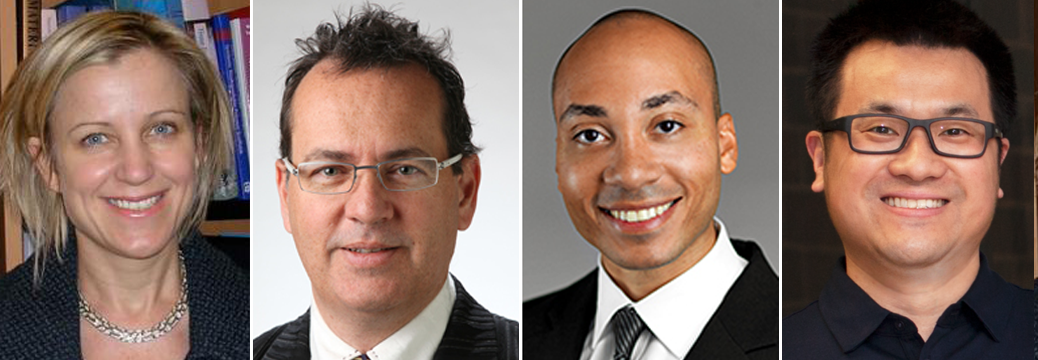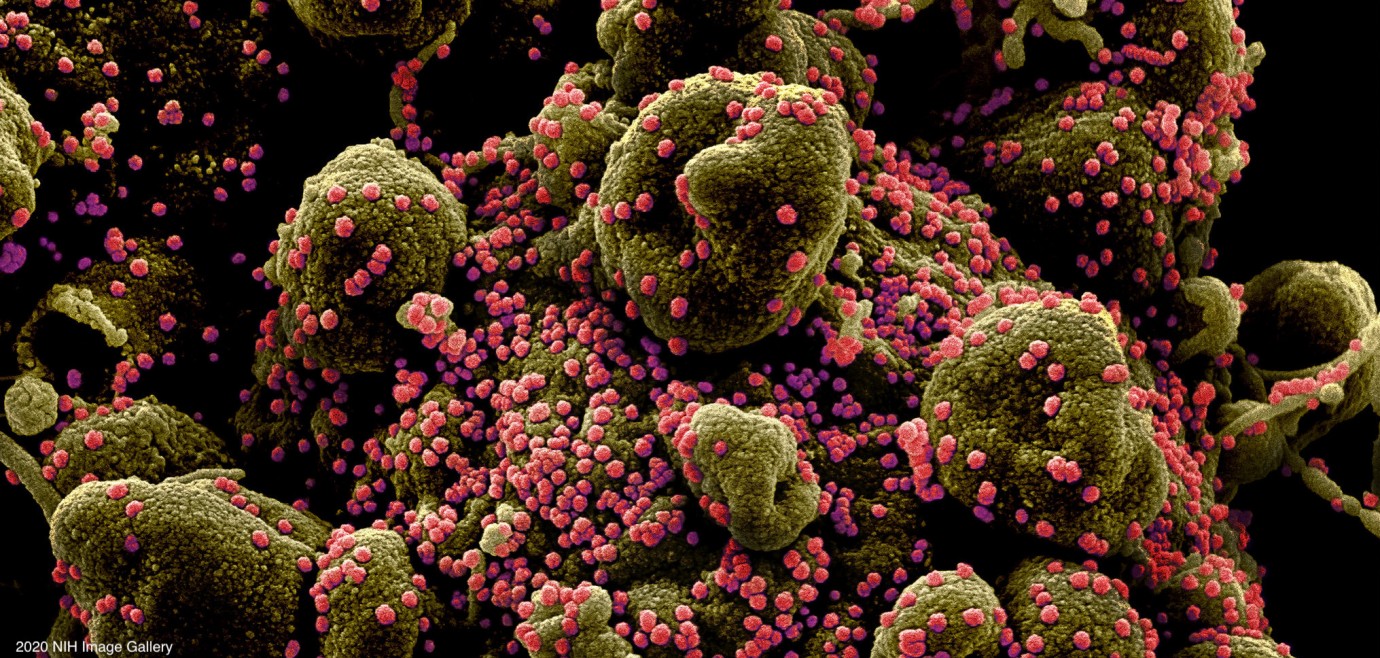December 14, 2020 | Jola Glotzer
CBC COVID-19 Response Award recognized
Multi-institute collaborative team including Profs. Melody Swartz and Jeffrey Hubbell (UChicago), Evan Scott (NU), and Ying (Samuel) Hu (UIC), which received CBC COVID-19 Response Award is recognized by the Chicago Immunoengineering Innovation Center

CBC COVID-19 Response Award recipients: (from left) Melody Swartz and Jeffrey Hubbell (UChicago), Evan Scott (NU) and Ying Samuel Hu (UIC).
Melody Swartz and Jeffrey Hubbell (UChicago), Evan Scott (NU) and Ying Samuel Hu (UIC) are one of three Chicago-based teams that received $500,000 CBC COVID-19 Response Award in September of 2020. The team won the award for the project titled “Novel Strategies for Enhancing Vaccine Efficacy Against SARS-CoV-2.”
The team’s project focuses on the development of an anti-SARS-CoV-2 vaccine. Professors Swartz, Hubbell, Scott and Hu plan to use the SARS-CoV-2 virus’s “spike” protein as an antigen to stimulate the production of anti-SARS-CoV-2 neutralizing antibodies. Located on the virus surface, the spike protein is required for its binding to receptors on the cell membrane of the epithelial cells which line the inner surface of human airways. Hence, the lungs are one of the primary targets of the SARS-CoV-2 virus.
The team will not only pursue the vaccine development but will also test a possibility to utilize nanomaterials as “facilitators” of the vaccine’s targeted delivery to selected parts of the immune system. If successful, this novel methodology could speed up both antibody and memory T-cells production, priming the immune system to execute a rapid and effective response once a person becomes exposed to the live virus.
Below, please find an article reposted from the Chicago Immunoengineering Innovation Center website which mentions the CBC COVID-19 Response Award among the projects currently being conducted at the Center.
Enjoy!
Chicago Immunoengineering Innovation Center, UChicago | December 7, 2020
COVID-19
The rapid evolution of the global pandemic of SARS-CoV-2, the causative coronavirus behind COVID-19 (coronavirus disease 2019), requires a nimble response. The center provides stimulus funds to our researchers to put their minds together to combat this disease.

Coronavirus.
Source: Chicago Immunoengineering Innovation Center
The exponential spread of the disease is evident based on absolute case numbers reported worldwide from March 3 (90,000 confirmed cases of COVID-19 worldwide) to April 3 (1 million cases), and then onwards to June 29 (10 million cases). It has been confirmed in more than 90% of the world’s nations and territories, also necessitates a nimble and concerted effort to fight it. Our researchers are dedicated to contributing their talents and resources towards efforts both at a global and local scale. In addition to donating our supplies to the medical workers at the frontlines of the fight (and continuing to do so!), immunoengineers are uniquely well-positioned to make a long-term impact as their training and expertise encompasses the development of diagnostics, vaccines, and treatments that can directly address the disease.
To support our researchers in their efforts to adapt their existing projects to a new disease, we and other initatives across the UChicago campus have instituted a small and local board of experts to review project proposals on a rolling basis, and we have even begun to provide short-term stimulus funds to enable them to pursue those projects. Here are some examples:
- A collaboration between the groups of Profs. Jeffrey Hubbell, Melody Swartz, and Aaron Esser-Kahn to pool vaccine technologies invented in their groups towards a prophylactic vaccine against the novel coronavirus. These include technologies that have broadened antibody responses against the Lassa arenavirus, enhanced immune responses against malaria, and can reprogram immune responses
- Among these vaccine candidates, the nanovaccine platform that broadens antibody responses against the Lassa arenavirus was recently funded by the Chicago Biomedical Consortium in a multi-institute collaboration that includes Profs. Melody Swartz, Jeffrey Hubbell, Evan Scott (Northwestern), and Ying (Samuel) Hu (UIC).
- The groups of Profs. Savas Tay, Kathleen Beavis (Pathology), Nishant Agrawal (Surgery), Jeremy Segal (Pathology), and Evgeniy Izumchenko (Medicine) are developing novel saliva-based disease detection methods, which can reduce the dependence on curbside and clinic locations for testing and pave the way for home-based testing or mail-in sample collection routes. Early results were published in a pre-print on MedRXiv, showing that saliva tests detected all curbside COVID19-positive cases confirmed through the Emergency Use Authorization-certified nasal swab test.
- An effort by the group of Prof. Jun Huang to create a SARS-CoV-2 pseudovirus, which can infect cells in similar fashion as the native virus, but cannot replicate or spread from one cell to another. Because the pseudovirus causes the infected cells to express a fluorescent reporter, this will be a useful tool to determine the efficacy of vaccines. For example, effective vaccines will elicit strong immune responses from a host such that the pseudovirus will no longer be able to infect the host as readily, leading to lower levels of fluorescent protein expression.
- Prof. Juan Mendoza‘s group was part of an international collaboration led by Dr. Ludmila Prokunina-Olsson at the National Cancer Institute, seeking to understand the link between interferons – part of the body’s natural response against infection – and expression of ACE2, the molecular target of the SARS-CoV-2 virus. It was previously thought that viral infections lead to interferon expression, and then to ACE2 expression, suggesting a vicious cycle wherein SARS-CoV-2 infection might lead to increased host display of its target. Their study, published in Nature Genetics, showed that interferon-induced ACE2 isoforms are truncated forms of the protein, such that SARS-CoV-2 cannot recognize them.
- A collaboration between the groups of Profs. Jeffrey Hubbell and Patrick Wilson (UChicago Dept of Medicine) to develop new therapeutics to address acute respiratory distress syndrome (ARDS), a severe complication experienced by patients suffering from the most severe forms of COVID-19.
- A collaboration between Prof. Jun Huang, Junhong Chen (PME), and Kathleen Beavis (UChicago Dept of Pathology) to design rapid-detection assays to accurately diagnose COVID19 in at home or point-of-care settings.
- In-house production and purification of SARS-CoV-2 spike protein and its subunits. As spike protein mediates cellular entry of SARS-CoV-2 virions, this has become the leading target for vaccination efforts, as the vaccine will effectively prevent any infections. We are scaling up efforts to supply UChicago researchers across campus with pure protein for their projects.
We continue to monitor developments in the COVID-19 epidemic, both from a scientific and from a global epidemiological standpoint. Together with our colleagues across the University of Chicago and beyond, we are working to deliver solutions that can directly impact your health. If you are interested in contributing to our mission, we welcome your support! Please follow us on our LinkedIn page for the latest news, or support our work directly by donating.
Source:
Adapted (with modifications) from the Chicago Immunoengineering Innovation Center, UChicago, published on December 7, 2020.
